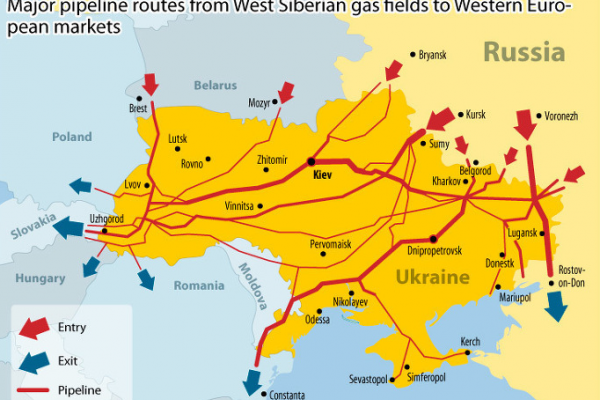We have discussed the sword of Damocles that is hanging over the heads of the Ukrainian (and European for that matter) people for some time. The dominant role that Russia plays in providing energy is becoming critical, however, as Gazprom notes:
- *GAZPROM SAYS TODAY IS DEADLINE FOR NAFTOGAZ TO PAY FOR FEB. GAS
- *NAFTOGAZ OVERDUE PAYMENTS AT $1.89B FOR GAS SUPPLIES: GAZPROM
- *GAZPROM SAYS NAFTOGAZ ISN’T OBSERVING CONTRACT
- *GAZPROM: UKRAINE DEBTS CREATE ‘RISK OF RETURN TO SITUATION AT BEGINNING OF 2009’Â (when Gazprom cut off Ukraine gas supplies)
Of course, the US agreed to $1b bailout yesterday – but that’s not supposed to be used as a direct transfer payment to the Russians.
Via Interfax,
The debt that Ukraine’s Naftogaz Ukrainy owes for Russian natural gas has risen to $1.89 billion, Gazprom CEO Alexei Miller told journalists.
“In fact, this means that Ukraine has stopped paying for gas,” Miller said.
“This is completely at odds with the provisions of the contract and international trade practice. For our part, we have always met and will meet our contractual obligations. But we can’t supply gas free of charge. Either Ukraine repays its debt and pays for current deliveries or the risk of returning to the situation at the beginning of 2009 will appear. We will notify the Russian government concerning the situation that is taking shape,” Miller said.
“Today, March 7, was the payment deadline for February’s deliveries of gas to Ukraine. Gazprom has not received payment on the debt. Including the price discount in effect in the first quarter, the overdue debt for gas has increased significantly and now totals $1.890 billion,” he said.
It would appear this is the most important map in Europe once again…

and what happened in 2009…
Gazprom demanded a price hike to $400-plus from $250, Kiev flatly refused, and on New Year’s day 2009, Gazprom began pumping only enough gas to meet the needs of its customers beyond Ukraine.
Again, the consequences were marked. Inevitably, Russia accused Ukraine of siphoning off supplies meant for European customers to meet its own needs, and cut supplies completely. As sub-zero temperatures gripped the continent, several countries – particularly in south-eastern Europe, almost completely dependent on supplies from Ukraine – simply ran out of gas. Some closed schools and public buildings; Bulgaria shut down production in its main industrial plants; Slovakia declared a state of emergency. North-western Europe, which had built up stores of gas since 2006, was less affected – but wholesale gas prices soared, a shock that was declared “utterly unacceptable” by Brussels.

